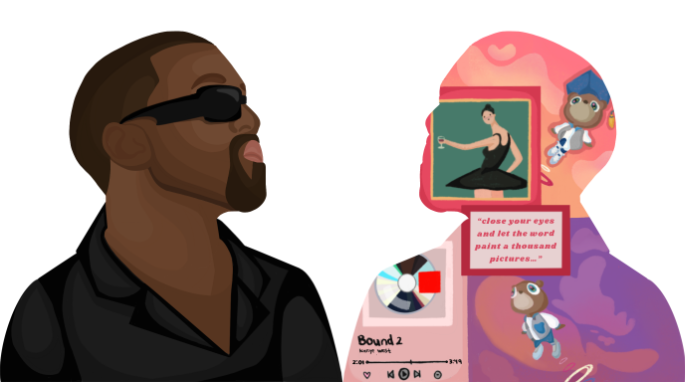Drawing the line: Ye’s recent remarks prompt question of whether to separate art from artists
Heartfelt, electronic dance beats.’80s-style synthesizer hooks. Explosive, speaker-breaking sounds that turned into a generation of melodic, introspective rap music. This is Ye, previously named Kanye West, arguably one of the most influential musicians of our century. With 24 Grammy awards, the producer, rapper and fashion designer’s music knows no limits, spanning from indie-rock to electro to gospel. Yet, after a slew of recent antisemitic remarks, Ye’s actions pose a moral dilemma — should we continue to indulge in the work of controversial figures?
Ye has always been vocal about his opinions on world events. In 2005, during a live telethon to raise money for Hurricane Katrina relief, Ye, who believed relief efforts were being mismanaged in predominantly poor neighborhoods, said that “George Bush doesn’t care about Black people.” In 2009, Ye famously interrupted Taylor Swift’s acceptance speech for Best Female Video at MTV’s Music Awards, citing his belief that Beyonce should have won. And most recently, in early October of 2022, he tweeted about “going death con 3 on JEWISH PEOPLE,” later posting a picture of a swastika inside the Star of David.
The tweet went viral, not only alarming millions of his fans and the general public, but also the businesses working with his brand. As a result, he was banned from social media platforms such as Twitter and Instagram and lost his billionaire status, as brands including Gap, Adidas and Balenciaga terminated their contracts with him. Ye later appeared on the talk show “Piers Morgan Uncensored” where he made it clear that he was “absolutely not” sorry for the statements he made.
But despite Ye’s highly publicized usage of hate speech, much of his fan base remains loyal prompting the question: is the creative pioneer behind each of his masterpiece albums the same Ye that was recently making antisemitic threats on social media?
Pro-ye or Con-ye?
For Palo Alto High School senior Avi Srinivasan, Ye’s music has been more than just an addition to his playlist — it has been a part of his life since the beginning of his childhood.
“I have been listening since I was six years old,” Srinivasan said. “He’s one of the most successful music artists of all time and the impact that he’s had just from the past is something that I appreciate very personally given that I’ve grown up listening to him and it sucks to see him right now.”
Despite Srinivasan’s appreciation for Ye’s music, he said he drew the line in supporting Ye’s behavior.
“The music he made was so well crafted and he produced it in an amazing way where you have to respect that in a sort of sense,” Srinivasan said. “But because I don’t really have a personal connection with that artist, it [Ye’s words] doesn’t affect me in the same way as it could affect people.”
Srinivasan said he has learned to appreciate Ye’s music, and other artists’ music, without going in-depth into its context. He believes that merely streaming his music is different from condoning his behavior.
“If you’re doing something that is going to promote them and get them on a bigger platform to post outlandish or bad things, then maybe you shouldn’t listen to [their] music,” Srinivasan said. “If you really just want to enjoy it, just take it for what it is and look at it at a very surface level, which I think is what the majority of people do.”
While Srinivasan can get the most out of listening to someone without having to like or respect them, other students feel that an artist’s art is intertwined with their identity, and in this case, Kanye’s antisemitic remarks are inseparable from his musical self.
Senior Dalia Antebi, who is culturally Jewish, admits that Ye’s words have altered her perception of him as an artist and his music, but she isn’t necessarily against others who listen to him.
“I’m going to have a problem with people who are more likely to have an aligned view with the things that he [Ye] is saying and the messages that he’s personally spreading,” Antebi said. “Because, if you’re closer to the artist, then you can be more easily influenced by his words and his actions.”
More than meets the eye
Paly music teacher Michael Najar said there is more to Ye’s actions than being simply “good” or “bad.”
“You need to investigate and contextualize all of their work,” Najar said. “It’s not just as simple as they are bad people because they did this. It’s too easy to do that. However, because Kanye is in front of us and actively saying these things, it makes it easier in some ways to make those kinds of decisions.”
Najar adds that the on-going criticism combined with Ye’s diagnosed bi-polar disorder makes it extremely difficult to resolve Ye’s controversy.
“No one wants to have a deep conversation about wanting him to be better, hoping he gets the help he needs and also realizing it’s not totally our place to judge,” Najar said. “There’s no perfect solution to any of this.”
While having mental health issues does not necessarily excuse Ye of his offensive remarks, Najar acknowledges the complexity behind not just his music, but also his opinions—as a musician himself, Najar wants the best for Ye.
“Let’s hope for the best,” Najar said. “If you believe in prayer, if you believe in good vibes, let’s send those things out. Let’s see if we can uncover the person that he [Ye] had promised to be and the person that he could become.”





